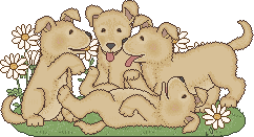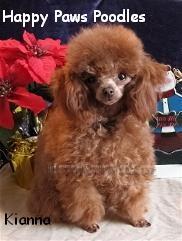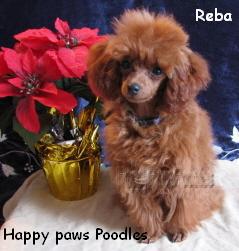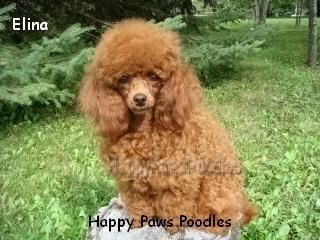
Dog ownership is like a rainbow. Puppies are the joy at one end. Old dogs
are the treasure at the other.
Certified 100 % cute
Most of our puppies are ready for their new homes between 10-12
weeks.
The puppies live in our smoke-free home and each pup receives the
individual attention and socializing required to start them off as stable and
confident pups, and we do everything possible to ensure that you receive a
healthy and happy puppy. We feed "NOW Puppy" to ensure a healthy pup.
We do not place our puppies with pet stores or sell at flea-markets. These
puppies are our babies, we spoil them with lots of love, as we are true
animals lovers.
We stay with our Moms all the time to ensure a safe delivery,
and they are given extra nutrition during their pregnancy and after.
I specialize in quality, not quantity. I have 4-5 generation
pedigree
on all my Poodles.
We do not inbreed such as father/daughter, mother/son, brother/sister
and half brother/sister for a health-temperament reason.
At 8 weeks they have their first shots.
All our Puppies will be Micro-chipped and registered with CKC.
The puppies have weekly baths starting at 6 weeks, to prepare them
for a lifetime of grooming. The clipping is gradual, to make it more of
a comfortable process. Starting with the face and feet at 6 weeks.
The sounds of the blow dryer, clippers, and the
clipper vacuum also help
to prepare them for airline travel.
The puppies will spend time outside when the weather is nice. They have
their own little space where they can run and play to get exercise and
fresh air.
You are always welcome to come to our home to pick up your puppy.
I'm armed with looks, brain, charm
and I know how to use them.
COAT CHANGE
Once the puppy is approximately 9-11 months old, they will start
to go through what is called a "coat change". This is where the soft,
silky puppy hair starts to change into a thicker and coarsely textured
coat (adult coat). During this time the coat will mat quickly.
Poodle coats have been known to mat
almost overnight while going
through the coat change, but not to worry, this period will be over
by the time the puppy is 15-18 months old. This does not mean your
puppy will never mat again, just not as easy. This is
why we
recommend 6-8 weeks between hair cuts and keep your puppy groomed
regularly to avoid painful de-matting and strain on your puppy.
They're wonderful non-shedding plush coats, you'll find they are one
of the cleanest, easiest dogs to live with, without the nuisance of pet
hair on clothing and furniture. These are great companions for those
that are allergic to dogs; they do not shed.
Poodles at times do not get their curls until 6-12 month of age.
Also color at birth is no guarantee of what their adult color may be.
Some reds fade and some darken.
Umm...I think I need to use the backyard
Microchip for Safety
This rice-sized computer chip is implanted under the skin, usually
between the dog's shoulder blades. The chip activates when a
"scanner" passes over and reads the registered identification number
that leads to the owner. The microchips cause no discomfort, cannot
be lost or altered, and easily last your dog's lifetime.
While tags still offer the most instantly obvious ID, they often fall
off the collar unnoticed. This leaves your dog-friend without anything
that says who owns him should he get lost. Most veterinarians and
shelters own and use scanners.
You can never have too much togetherness.
PUPPY'S TEETH
Your puppy probably had most, if not all, of her 28 puppy teeth
(deciduous teeth) when you first brought her home. Deciduous teeth,
which erupt around 3 to 6 weeks of age, work just fine for puppy food,
though you may want to moisten dry food if your puppy is just learning
to eat it.
At 3 to 4 month of age, your puppy will start losing her deciduous teeth
as permanent teeth come in. Most puppies swallow their puppy teeth as
they eat, so you probably won't even see the lost teeth. Teething in
puppies is similar to teething in human infants, except that it only takes
a few months. Your puppy may be fussy and refuse to eat. She will also
chew almost anything she can get her teeth around.
You can't avoid the chewing phase of teething, so give your youngster
plenty of safe chew toys. Keep an eye on your little friend to keep your
shoes, carpet, furniture and other objects safe. Don't give your puppy
any medication or treatment for teething pain without first consulting your
veterinarian. Sympathy is always good and can be administered in unlimited
amounts. Sometimes a permanent tooth comes in before the corresponding
deciduous tooth has been lost. The puppy will then have two teeth in the
same space (one behind the other). This situation that can lead to
malocclusion and periodontal disease. If your puppy has this problem,
contact your veterinarian, who can remove the unneeded deciduous teeth.

















